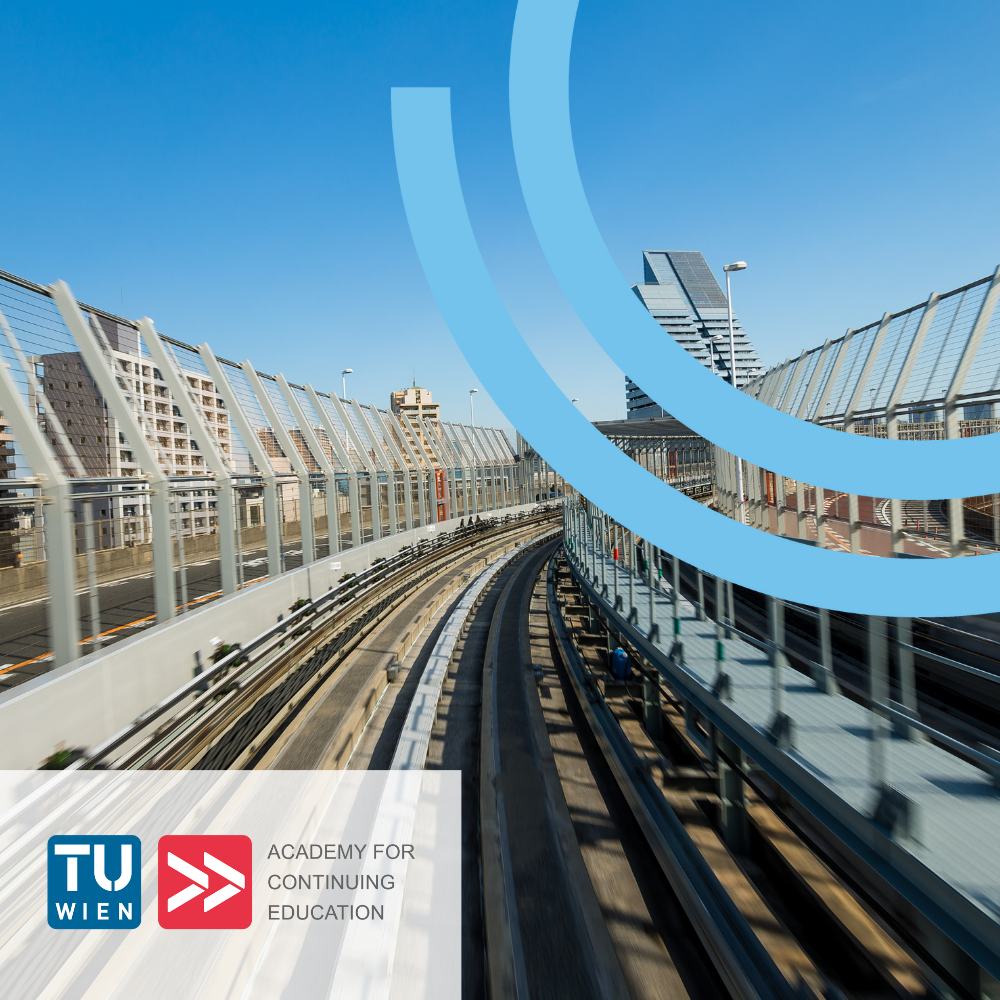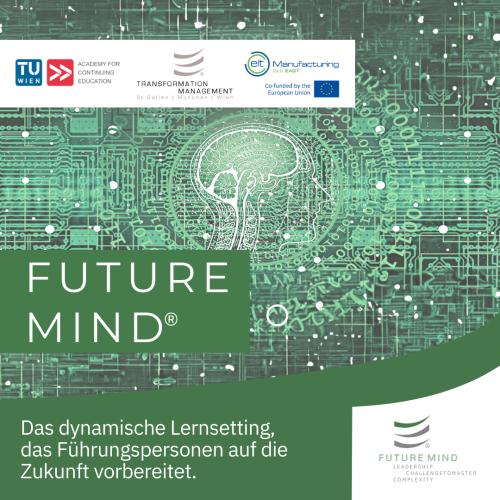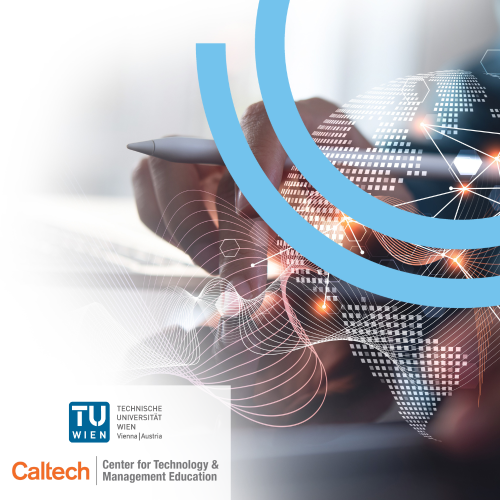Executive MBA: Mobility Transformation
Note for groups: If you are buying this product for multiple participants, you will be able to assign licenses after completing the order. Please select “Group” and the number of seats you require.
At a glance:
- Final Degree: Executive Master of Business Administration (EMBA) | Mobility Transformation
- Duration: 3 semesters + Master’s Thesis
- Language: German
Shape the future of mobility!
Mobility is currently undergoing a phase of fundamental transformation. It presents society with major challenges and at the same time holds enormous potential. The interplay with digitalisation, urbanisation, connectivity and individualisation is increasing demand for innovative solutions that are geared to people’s needs as never before. At the same time, mobility is undergoing a major political and ecological transformation and must make an important contribution towards meeting the UN climate goals by taking measures towards “zero emission mobility”. In the future, these two developments must be combined in a reasonable way.
Technologies and innovations are key factors in the future of mobility. In our Executive MBA program, you will acquire the basic technical knowledge and key business skills to build up the competency to discuss and make decisions on general management issues against the background of technological developments. In the “Leadership & Organisational Behaviour Retreat”, you will grow beyond yourself and get to know your leadership behaviour anew. Experience and practice-oriented learning as well as intensive dialogue and interaction in small groups will raise your leadership competence to a new level and make you a stronger leader. At the heart of the Executive MBA program, you will deal intensively with mobility technologies and future-oriented mobility infrastructures.
In addition, you will have the opportunity to acquire further qualifications in our “electives”: whether preparing for international certification as a project manager or working on real, legal issues in your business. Practice-oriented examples and exclusive insights into real-life experiences round off your EMBA Journey.
Rethink the mobility newly and actively shape the way to zero-emission mobility by 2050!
Key learnings
- Know-how about navigating your company or organisation
- Decision-making competence in management and new technologies
- Empowerment of your leadership personality
- Know-how and practical tools for developing innovation strategies in order to unfold the potential of new technologies at all levels
- Additional qualifications in our electives Accelerator & Innovation Projects and Field Study to European hotspots
Thus, look up from your process chart, deepen your skills and expand your network! It’s worth it!
Final Degree: Executive Master of Business Administration (EMBA) in Management & Technology | Mobility Transformation
ECTS Credits: 90
Duration: 3 semesters + Master’s Thesis
Structure: Part-time, blocked in modules
Language: German
Admission Requirements: First academic degree; 3 years of work experience; personal interview
Locations: TU Wien, surrounding area of Vienna
Academic Directors: Univ.Prof. Dr.-Ing. Sebastian Schlund und Dr. Sandra Stein
Management & Technology | 15 days
In the Base Camp around the topics of “Management & Technology”, you will deepen your knowledge in the areas of “Finance, Accounting & Economics”, “Managing Technologies” and “Strategy & Marketing”.
Your key learnings in the area of “Finance, Accounting & Economics”
You will learn
- to explain the basic aspects of internal and external corporate accounting, to apply them independently in the practical working environment and to use them for business decisions.
- to solve practical financing and valuation problems by applying basic financial principles.
- discuss macroeconomic relationships and current economic policy measures, apply central economic theories and concepts, and analyse the consequences of individual decisions in a market economy context
Your Key Learnings in “Managing Technologies”
You will learn
- the fundamental aspects of data science and technology management
- to select appropriate methods for data collection, apply suitable estimation procedures, and analyse the results of a routine sample survey.
- describe basic concepts of probability and statistics and apply them to analyse simple data sets.
- assess the impact of big data on businesses and how the analysis of (big and heterogeneous) data can be used in your working environment
- understand the potential applications of new technologies from a management perspective
- present new technologies and assess what influence they have on your work environment and how they can be used in the respective context.
- present the basics of innovation processes on a company level, identify and apply important tools, models and methods of innovation management and develop innovation strategies.
Your Key Learnings in the area of “Marketing & Strategy”
You will learn
- to discuss the core topics of marketing and consumer behaviour and to apply them in practice to specific situations
- to create specific marketing analyses and strategic marketing plans
- to explain the complexity of global business processes in a dynamic and competitive environment.
- apply knowledge from various business disciplines, both individually and collectively to solve practical problems.
- learn how to strategically manage internationally operating companies using performance indicators and financial ratios.
Leadership & Organisational Behaviour | Leadership-Retreats | 9 days
You will learn
- to explain the basics of behaviour and the role of leadership in organisations.
- to differentiate between different leadership styles.
- to analyse the behaviour of employees and teams in organisations as well as of organisations.
- to develop starting points for change initiatives.
- to set clear priorities in your decision-making processes in order to influence your employees.
- to describe group processes and to design them.
- to define the development dynamics of organisations on a structural, processual and cultural level and to influence transformation processes through the methods learned.
Mobility Technologies | 4 days
You will learn
- to assess trends, long-term developments and transition paths toward new mobility technologies and formulate their prerequisites as well as opportunities and risks and to evaluate the use of technologies
- to shift journeys to environmentally friendly means of transport and routes as far as possible and to organize the necessary traffic efficiently.
Mobility Infrastructure | 5 days
You will learn
- to assess the significance and characteristics of future mobility infrastructure.
- to independently develop solutions for the design of future mobility infrastructure.
- to be able to actively shape zero-emission mobility by the year 2050
Mobility Platforms and Business Models | 6 days
You will learn
- to develop and evaluate new business models in the field of mobility transformation.
- to evaluate technological and infrastructural aspects and adequately incorporate them into specific business models.
Electives: Project Management | 6 days
The Elective “Project Management” aims at teaching the basics of project management. On the basis of project simulations or concrete projects, the key points of the content-related, methodical, social and time-related work in projects are analysed and the analysis, the concept creation and the implementation phases with the respective necessary framework conditions (e.g. project marketing, project controlling) are explained. Upon completion of the elective, you will be able to present a fully planned project for certification according to IPMA (Level B or C).
Your Key Learnings
- You know the basic approach to project management according to IPMA and which advantages project management offers as a business process.
- You know the process model and the contents of project management (project start, coordination, controlling, marketing, closing and the handling of project crises).
- You know which project management methods are used in the individual project management processes and can apply them in practice.
- You are able to identify possible “stumbling blocks” in advance and thus reduce the risk of failure.
- You will be able to distinguish which project complexity requires which methods.
- You know how to put together a project team and how to manage it according to the situation. You are able to fulfil your role as a team member in a project in an optimal way.
- You are able to plan, control, coordinate and successfully complete projects independently and on your own responsibility (Level B or C).
- You are able to use project management software (MS Project) in relation to different areas of project management
Master’s thesis
In your Master’s thesis, you will work independently on a problem by applying scientific methods in a topic area of your own choice. In most cases, it is a question with practical relevance to your own working environment.
This MBA is the right choice if you aim to
- start or grow a company,
- become a proactive innovation lead in your organisation,
- understand your role as an entrepreneur or intrapreneur or
- want to proactively effect change in your organisation.
The MBA particularly addresses professionals with a technical or scientific background from the following areas:
- Transport and logistics
- Mobility of people and goods
- Infrastructure management
- Mobility services
- Public service
- Non-profit organisations and public institutions
- SMEs.
Next start: October 2025
This program is designed for professionals and allows you to balance your job, family and MBA. It allows you to work whilst developing new entrepreneurial skills, knowledge and competencies. The program runs for 18 months and classes are taught in a block format usually from Thursday-Saturday or Friday-Sunday, usually about every 4 weeks. In total, the program consists of 45 teaching days.
Didactics
All modules are divided into a preparation phase, the in-class time and a follow-up phase.
Individual preparation phase
The individual preparation phase for a module includes pre-readings, preparation of case studies, preparation of presentations, essays, etc.
In-class time
The MBA classes use a wide variety of teaching and learning methods. These range from interactive case studies, simulations and calculations to classical presentations, but also include discussions, group dynamic exercises and reflections. Modules take place in full-day blocks and usually last between 3-5 days.
Individual follow-up phase
The individual follow-up phase is intended to consolidate or apply what has been learned in class. Depending on the module, the follow-up phase may include writing assignments, case studies, reflections or exams.
Want to know more?
Please contact us for further information.





